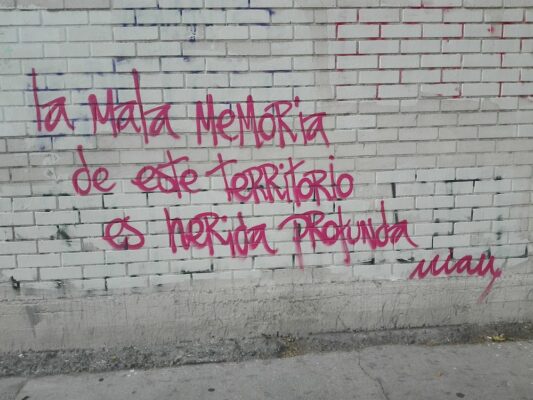Search
To search for an exact match, type the word or phrase you want in quotation marks.
A*DESK has been offering since 2002 contents about criticism and contemporary art. A*DESK has become consolidated thanks to all those who have believed in the project, all those who have followed us, debating, participating and collaborating. Many people have collaborated with A*DESK, and continue to do so. Their efforts, knowledge and belief in the project are what make it grow internationally. At A*DESK we have also generated work for over one hundred professionals in culture, from small collaborations with reviews and classes, to more prolonged and intense collaborations.
At A*DESK we believe in the need for free and universal access to culture and knowledge. We want to carry on being independent, remaining open to more ideas and opinions. If you believe in A*DESK, we need your backing to be able to continue. You can now participate in the project by supporting it. You can choose how much you want to contribute to the project.
You can decide how much you want to bring to the project.

The first time I heard these two words together was back in the 1990s when the Chilean state sought a “legal,” clean, and conflict-free way. A “solution” to the grave effects of crimes against humanity committed during the civic-military dictatorship. The methods used to achieve this neither repaired nor, much less, restored the radical damage that institutional violence had caused to society and all those who had been directly subjected to that violence. The wound, the lack of truth and justice, remain a social fracture. Today, these two words speak to me of the deep colonial wound that remains open.
The four voices invited to contribute to this issue on restitution and reparation speak to us from different territories and spaces, where they are articulating and weaving together anti-colonial, anti-racist, anti-capitalist, and anti-patriarchal struggles.
We see that the effects of the coloniality of power and ongoing colonization are more active than ever, with the drums of war from the West, the genocide and terricide of populations and territories like Palestine, Congo, Sudan, Haiti, among many others; the thousands of migrants deported and killed in the migratory processes in the Mediterranean; the plundering of natural resources, and a long etcetera.
Meanwhile, cultural and art institutions attempt to formalize possible responses to the idea of “decolonizing” with gestures that turn out to be more self-complacent than a real solution. All within the programmatic framework that Western states like France, Canada, the United States, or Spain have constructed, once again appropriating the struggles originating from the colonized territories.
The debate on the profound harm that colonization, patriarchy, and capitalism have caused and continue to cause in much of the world is now widely visible, filling book pages, seminar chairs, hours of media debates, in academia and museums. But it is not simply a matter of materially returning objects, as what has been plundered from the territories over these more than five centuries are ways of life, of doing, of existing, as one of our guests, researcher and activist Yuderkis Espinosa Miñoso, points out.
As Yaiza Hernández Velázquez, researcher and another of our guests, reminds us, the necessary and essential restitution of what has been stolen does not resolve anything if it does not participate in the construction of a horizon that redefines private property itself, borders, international legislation, and racial capitalism, among others.
For another of our guests, activist Hache Mau, if we were to speak of a real possibility of transforming art spaces or museums, these should transform into spaces of activism with radical critical reflections on material, epistemic, and symbolic plundering, challenging every structure and supremacist Western canon.
Finally, as researcher and writer Helios F. Garcés points out, it is not possible to decolonize (the museum, the state, our territories) without first transforming the current colonial, patriarchal, capitalist system. Therefore, restitution and reparation are themselves that social transformation, fighting for a more just and oppression-free society.
Beyond where these debates, stagings, and the thousands of formulas we think and discuss in the field of art lead us, processes of restitution and reparation are taking place from within the communities and territories devastated by coloniality. Continuous processes of resistance that sustain other models of life, of doing, of feeling, of seeing, and of thinking.
Perhaps a task we can undertake from the field of art is to review and rethink the role of the museum — and whether its existence is necessary — and from the root, the very concept of art.
(Cover Image: Graffiti wall in Santiago de Chile during the social outburst of 2019. Photo: Nancy Garín)

NANCY GARÍN GUZMÁN (Valparaíso, 1972) is a journalist and art historian, works on projects related to critical thinking, new pedagogies, archives, memory and decolonialism. She studied the Independent Studies Program at MACBA (PEI). As a member of the Etcétera collective and the Errorist International. She has been part of research groups such as Peninsula: Colonial processes and artistic and curatorial practices (2012 -2018) and Contraimaginarios (Postpandémicos) (2022-2023). She is part of the research and production platforms Equipo re (2010 to present) with whom she has been developing the project Anarchivo sida and the group Espectros de lo Urbano (2017 to present) research around the urban as part of the colonial, capitalist and patriarchal machinery. During 2022-2023 she has been resident at ADKDW Cologne and is part of the research group Contraimaginarios at Arts Santa Monica/Barcelona . She has worked as a teacher and mentor/tutor in different spaces of critical and experimental pedagogies. She is currently teaching at PEI/MACBA (2023-2024).
"A desk is a dangerous place from which to watch the world" (John Le Carré)